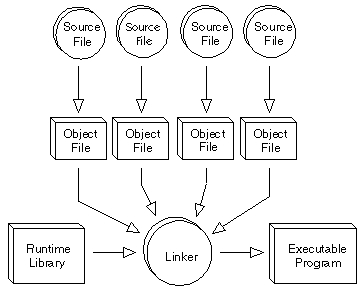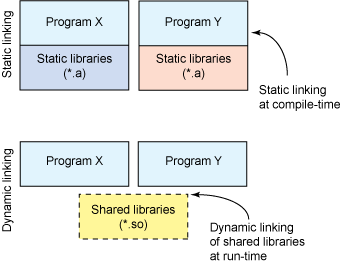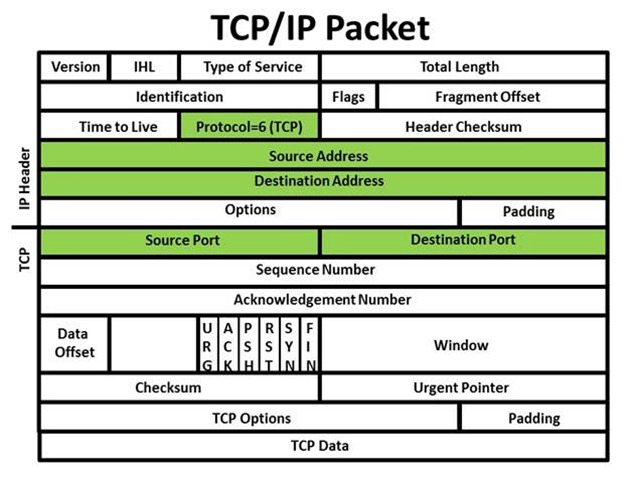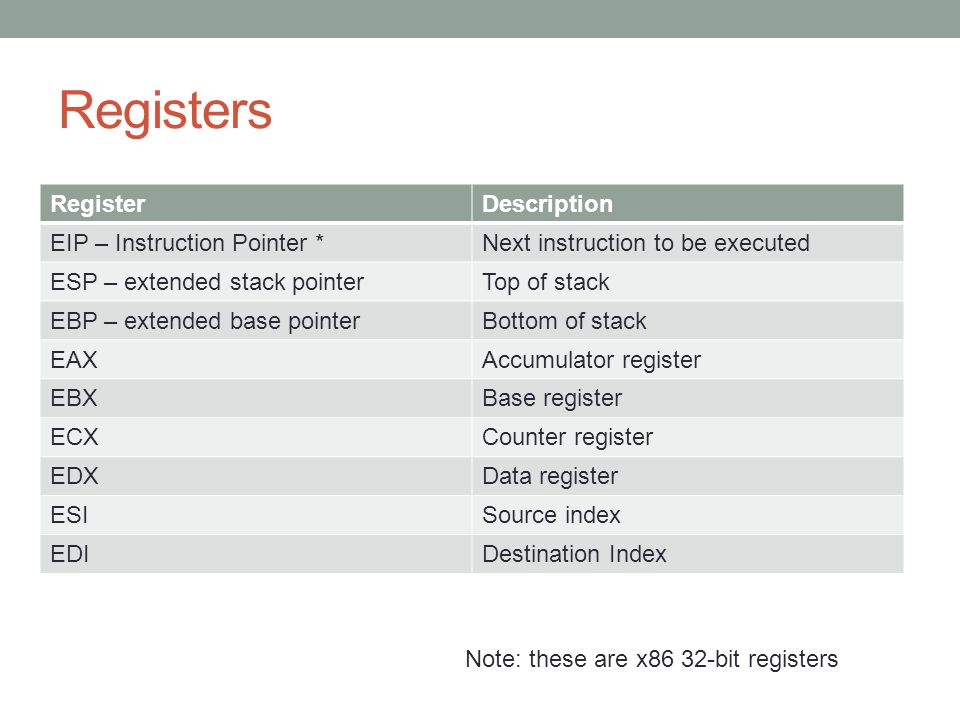Reverse Engineering
How to read programs without the source code
Created by jyn with reveal.js
Bookkeeping
This talk: https://github.com/jyn514/reverse-engineering-talk/
Cyber security groupme:
What is Reverse Engineering?
Taking a binary executable and figuring out what it does
Why RE?
(ordered from least to most sketchy)
- Debug compiler output
- Figure out what a virus is doing
- Mod a game not designed to be modded (e.g. Minecraft)
- Exploit a program
- Steal information from a competitor
Examples
If you have source code
If you're looking at strings
What if it's not that simple?
Memory Models
Stack, heap, and static memory

How do compilers use the stack?

What is linking?
The standard library needs to be compiled in somehow
A program called a 'linker' merges your code with the standard library

What is dynamic linking?
Putting the standard library in every program is expensive. What if we could avoid that?

What's an ABI?
Keeping the expected data format the same
Like an API but for binaries
There's a much better writeup hereABI Examples
IP Packets

ABI Examples
Linux Kernel

Assembly Crash Course
Remember 212?

Registers

CISC vs RISC
Complex Instruction Set Computer vs Reduced
You may have heard of RISC-V. x86 is the exact opposite:
- Hundreds of instructions
- Variable length instructions
- Same mnemonic for different encodings
- Many addressing modes
- Backwards compatible over several decades
Common x86 Instructions
Common x86 Instructions
mov/movq/movl- move some data from {register,memory,immediate} to {register,memory}.movl $0,%edi # move 0 into index registeradd- add data to a registeraddl $8, %edi # add 8 to the index registercmpandje- Compare two values and jump if they're equalloop: cmpl $10,%eax # check if we hit the end je exit addl $1, %eax jmp loop exit: movl $1,%eax
Common x86 Instructions
xor- acts on two registers or register and immediatexor %eax, %eax # fast way to set eax to 0pushandpop- store or load things onto the stackpushl %eax # save the contents of eax mov $5, %eax # do something with eax pop %eax # restore eax to former glory
callandret- function instructions_start: call power mov %eax, %ebx # return code movl $1, %eax # syscall number syscall power: movl 4(%esp), %ebx # put first argument in %ebx movl 8(%esp), %ecx # put second argument in %ecx movl $1,%eax # result = 1 ret
Common x86 Instructions
Common x86 Instructions
lea- load effective addresslea 0x4(%rsp),%rcxnop- no operation
Addressing modes
- Immediate:
mov $10, %eax
(assigning a constant to a variable) - Direct:
mov %esi, %eax
(assigning a variable to a variable) - Indirect:
mov (%esi), %eax
(dereferencing a pointer) - Offset:
mov 0x2000(%eax), %eax
(accessing an array, no pointer math) - Scaled offset:
mov 0x3113(,%eax,4), %ebx
(array indexing, pointer math)
Example
# printf.c:15: size_t len = 0;
movq $0, -16(%rbp) #, len
# printf.c:16: fputs("Enter the password: ", stdout);
movq stdout(%rip), %rax # stdout, stdout.0_1
movq %rax, %rcx # stdout.0_1,
movl $20, %edx #,
movl $1, %esi #,
leaq .LC1(%rip), %rdi #,
call fwrite@PLT #
# printf.c:17: getline(&line, &len, stdin);
movq stdin(%rip), %rdx # stdin, stdin.1_2
leaq -16(%rbp), %rcx #, tmp93
leaq -24(%rbp), %rax #, tmp94
movq %rcx, %rsi # tmp93,
movq %rax, %rdi # tmp94,
call getline@PLT #
# printf.c:18: if (strcmp(line, "Magic super secret constant\n")) {
movq -24(%rbp), %rax # line, line.2_3
leaq .LC2(%rip), %rsi #,
movq %rax, %rdi # line.2_3,
call strcmp@PLT #
testl %eax, %eax # _4
je .L3 #,
# printf.c:19: error();
call error #
.L3:
# printf.c:21: puts("You won!");
leaq .LC3(%rip), %rdi #,
call puts@PLT #
movl $0, %eax #, _14
Let's figure this one out
0000000000000894 <main>:
894: 55 push %rbp
895: 48 89 e5 mov %rsp,%rbp
898: 48 83 ec 20 sub $0x20,%rsp
89c: 64 48 8b 04 25 28 00 mov %fs:0x28,%rax
8a3: 00 00
8a5: 48 89 45 f8 mov %rax,-0x8(%rbp)
8a9: 31 c0 xor %eax,%eax
8ab: 48 c7 45 f0 00 00 00 movq $0x0,-0x10(%rbp)
8b2: 00
8b3: 48 8b 05 56 07 20 00 mov 0x200756(%rip),%rax # 201010 <stdout@@GLIBC_2.2.5>
8ba: 48 89 c1 mov %rax,%rcx
8bd: ba 14 00 00 00 mov $0x14,%edx
8c2: be 01 00 00 00 mov $0x1,%esi
8c7: 48 8d 3d fd 00 00 00 lea 0xfd(%rip),%rdi # 9cb <_IO_stdin_used+0x1b>
8ce: e8 7d fe ff ff callq 750 <fwrite@plt>
8d3: 48 8b 15 46 07 20 00 mov 0x200746(%rip),%rdx # 201020 <stdin@@GLIBC_2.2.5>
8da: 48 8d 4d f0 lea -0x10(%rbp),%rcx
8de: 48 8d 45 e8 lea -0x18(%rbp),%rax
8e2: 48 89 ce mov %rcx,%rsi
8e5: 48 89 c7 mov %rax,%rdi
8e8: e8 43 fe ff ff callq 730 <getline@plt>
8ed: 48 8b 45 e8 mov -0x18(%rbp),%rax
8f1: 48 8d 35 e8 00 00 00 lea 0xe8(%rip),%rsi # 9e0 <_IO_stdin_used+0x30>
8f8: 48 89 c7 mov %rax,%rdi
8fb: e8 20 fe ff ff callq 720 <strcmp@plt>
900: 85 c0 test %eax,%eax
902: 74 05 je 909 <main+0x75>
904: e8 71 ff ff ff callq 87a <error>
909: 48 8d 3d e9 00 00 00 lea 0xe9(%rip),%rdi # 9f9 <_IO_stdin_used+0x49>
910: e8 eb fd ff ff callq 700 <puts@plt>
915: b8 00 00 00 00 mov $0x0,%eax
91a: 48 8b 4d f8 mov -0x8(%rbp),%rcx
91e: 64 48 33 0c 25 28 00 xor %fs:0x28,%rcx
925: 00 00
927: 74 05 je 92e <main+0x9a>
929: e8 e2 fd ff ff callq 710 <__stack_chk_fail@plt>
92e: c9 leaveq
92f: c3 retq
Can we make this easier?
Common C idioms
if/then/elsewhileargvforswitchrecursion
If
Hint: look for cmp
0000000000000864 <main>:
864: 55 push %rbp
865: 48 89 e5 mov %rsp,%rbp
868: 48 83 ec 20 sub $0x20,%rsp
86c: 64 48 8b 04 25 28 00 mov %fs:0x28,%rax
873: 00 00
875: 48 89 45 f8 mov %rax,-0x8(%rbp)
879: 31 c0 xor %eax,%eax
87b: 48 c7 45 f0 00 00 00 movq $0x0,-0x10(%rbp)
882: 00
883: 48 8b 05 86 07 20 00 mov 0x200786(%rip),%rax # 201010 <stdout@@GLIBC_2.2.5>
88a: 48 89 c1 mov %rax,%rcx
88d: ba 12 00 00 00 mov $0x12,%edx
892: be 01 00 00 00 mov $0x1,%esi
897: 48 8d 3d fd 00 00 00 lea 0xfd(%rip),%rdi # 99b <_IO_stdin_used+0x1b>
89e: e8 7d fe ff ff callq 720 <fwrite@plt>
8a3: 48 8b 05 76 07 20 00 mov 0x200776(%rip),%rax # 201020 <stdin@@GLIBC_2.2.5>
8aa: 48 8d 55 ec lea -0x14(%rbp),%rdx
8ae: 48 8d 35 f9 00 00 00 lea 0xf9(%rip),%rsi # 9ae <_IO_stdin_used+0x2e>
8b5: 48 89 c7 mov %rax,%rdi
8b8: b8 00 00 00 00 mov $0x0,%eax
8bd: e8 1e fe ff ff callq 6e0 <__isoc99_fscanf@plt>
8c2: 8b 45 ec mov -0x14(%rbp),%eax
8c5: 3d 8f a8 00 00 cmp $0xa88f,%eax
8ca: 74 05 je 8d1 <main+0x6d>
8cc: e8 79 ff ff ff callq 84a <error>
8d1: 48 8d 3d d9 00 00 00 lea 0xd9(%rip),%rdi # 9b1 <_IO_stdin_used+0x31>
8d8: e8 13 fe ff ff callq 6f0 <puts@plt>
8dd: b8 00 00 00 00 mov $0x0,%eax
8e2: 48 8b 4d f8 mov -0x8(%rbp),%rcx
8e6: 64 48 33 0c 25 28 00 xor %fs:0x28,%rcx
8ed: 00 00
8ef: 74 05 je 8f6 <main+0x92>
8f1: e8 0a fe ff ff callq 700 <__stack_chk_fail@plt>
8f6: c9 leaveq
8f7: c3 retq
8f8: 0f 1f 84 00 00 00 00 nopl 0x0(%rax,%rax,1)
8ff: 00The answer:
while
0x000000000000083b <+23>: movl $0x4,-0xc(%rbp)
...
0x0000000000000862 <+62>: lea -0x10(%rbp),%rax
0x0000000000000866 <+66>: mov %rax,%rsi
0x0000000000000869 <+69>: lea 0x110(%rip),%rdi # 0x980
0x0000000000000870 <+76>: mov $0x0,%eax
0x0000000000000875 <+81>: callq 0x6c0 <__isoc99_scanf@plt>
0x000000000000087a <+86>: jmp 0x889 <main+101> # check condition immmediately
0x000000000000087c <+88>: mov -0x10(%rbp),%eax # loop body
0x000000000000087f <+91>: add $0x5,%eax
0x0000000000000882 <+94>: mov %eax,-0x10(%rbp)
0x0000000000000885 <+97>: subl $0x1,-0xc(%rbp) # where have we seen this?
0x0000000000000889 <+101>: mov -0x10(%rbp),%eax # jump target
0x000000000000088c <+104>: cmp $0x31,%eax # while comparison
0x000000000000088f <+107>: jle 0x87c <main+88> # goes backwards to loop
0x0000000000000891 <+109>: mov -0x10(%rbp),%eax
0x0000000000000894 <+112>: cmp $0x34,%eax
0x0000000000000897 <+115>: jne 0x89f <main+123>
0x0000000000000899 <+117>: cmpl $0x0,-0xc(%rbp) # two comparisons!
0x000000000000089d <+121>: je 0x8a4 <main+128>
0x000000000000089f <+123>: callq 0x80a <error>
0x00000000000008a4 <+128>: lea 0xd8(%rip),%rdi # 0x983
0x00000000000008ab <+135>: callq 0x6a0 <puts@plt>Answer
argv
a.k.a command-line arguments
0000000000000714 <main>:
714: 55 push %rbp
715: 48 89 e5 mov %rsp,%rbp
718: 48 83 ec 10 sub $0x10,%rsp
71c: 89 7d fc mov %edi,-0x4(%rbp)
71f: 48 89 75 f0 mov %rsi,-0x10(%rbp)
723: 83 7d fc 02 cmpl $0x2,-0x4(%rbp)
727: 75 1e jne 747 <main+0x33>
729: 48 8b 45 f0 mov -0x10(%rbp),%rax
72d: 48 83 c0 08 add $0x8,%rax
731: 48 8b 00 mov (%rax),%rax
734: 48 8d 35 c0 00 00 00 lea 0xc0(%rip),%rsi # 7fb <_IO_stdin_used+0x1b>
73b: 48 89 c7 mov %rax,%rdi
73e: e8 7d fe ff ff callq 5c0 <strcmp@plt>
743: 85 c0 test %eax,%eax
745: 74 05 je 74c <main+0x38>
747: e8 ae ff ff ff callq 6fa <error>
74c: 48 8d 3d bf 00 00 00 lea 0xbf(%rip),%rdi # 812 <_IO_stdin_used+0x32>
753: e8 58 fe ff ff callq 5b0 <puts@plt>
758: b8 00 00 00 00 mov $0x0,%eax
75d: c9 leaveq
75e: c3 retq
75f: 90 nop
Answer
for
Guess what? It's the same as a while loop
839: 31 c0 xor %eax,%eax
83b: 48 8b 05 ce 07 20 00 mov 0x2007ce(%rip),%rax # 201010 <stdout@@GLIBC_2.2.5>
842: 48 89 c1 mov %rax,%rcx
845: ba 14 00 00 00 mov $0x14,%edx
84a: be 01 00 00 00 mov $0x1,%esi
84f: 48 8d 3d 15 01 00 00 lea 0x115(%rip),%rdi # 96b <_IO_stdin_used+0x1b>
856: e8 85 fe ff ff callq 6e0 <fwrite@plt>
85b: 48 8d 45 f0 lea -0x10(%rbp),%rax
85f: 48 89 c6 mov %rax,%rsi
862: 48 8d 3d 17 01 00 00 lea 0x117(%rip),%rdi # 980 <_IO_stdin_used+0x30>
869: b8 00 00 00 00 mov $0x0,%eax
86e: e8 4d fe ff ff callq 6c0 <__isoc99_scanf@plt>
873: c7 45 f4 04 00 00 00 movl $0x4,-0xc(%rbp)
87a: eb 0d jmp 889 <main+0x65>
87c: 8b 45 f0 mov -0x10(%rbp),%eax
87f: 83 c0 05 add $0x5,%eax
882: 89 45 f0 mov %eax,-0x10(%rbp)
885: 83 6d f4 01 subl $0x1,-0xc(%rbp)
889: 83 7d f4 00 cmpl $0x0,-0xc(%rbp)
88d: 7f ed jg 87c <main+0x58>
88f: 8b 45 f0 mov -0x10(%rbp),%eax
892: 83 f8 34 cmp $0x34,%eax
895: 74 05 je 89c <main+0x78>
897: e8 6e ff ff ff callq 80a <error>
89c: 48 8d 3d e0 00 00 00 lea 0xe0(%rip),%rdi # 983 <_IO_stdin_used+0x33>
8a3: e8 f8 fd ff ff callq 6a0 <puts@plt>
8a8: b8 00 00 00 00 mov $0x0,%eaxswitch
Same as a series of if/else statements, right?
71b: 48 89 44 24 08 mov %rax,0x8(%rsp)
720: 31 c0 xor %eax,%eax
722: e8 99 ff ff ff callq 6c0 <fputs@plt>
727: 48 8d 74 24 04 lea 0x4(%rsp),%rsi
72c: 48 8d 3d 5d 02 00 00 lea 0x25d(%rip),%rdi # 990 <_IO_stdin_used+0x30>
733: 31 c0 xor %eax,%eax
735: e8 96 ff ff ff callq 6d0 <__isoc99_scanf@plt>
73a: 8b 44 24 04 mov 0x4(%rsp),%eax
73e: 83 f8 01 cmp $0x1,%eax
741: 74 22 je 765 <main+0x65>
743: 7f 0d jg 752 <main+0x52>
745: 85 c0 test %eax,%eax
747: 48 8d 3d 45 02 00 00 lea 0x245(%rip),%rdi # 993 <_IO_stdin_used+0x33>
74e: 74 31 je 781 <main+0x81>
750: eb 28 jmp 77a <main+0x7a>
752: 83 f8 02 cmp $0x2,%eax
755: 74 1a je 771 <main+0x71>
757: 83 f8 03 cmp $0x3,%eax
75a: 48 8d 3d 64 02 00 00 lea 0x264(%rip),%rdi # 9c5 <_IO_stdin_used+0x65>
761: 74 1e je 781 <main+0x81>
763: eb 15 jmp 77a <main+0x7a>
765: 48 8d 3d 36 02 00 00 lea 0x236(%rip),%rdi # 9a2 <_IO_stdin_used+0x42>
76c: e8 2f ff ff ff callq 6a0 <puts@plt>
771: 48 8d 3d 40 02 00 00 lea 0x240(%rip),%rdi # 9b8 <_IO_stdin_used+0x58>
778: eb 07 jmp 781 <main+0x81>
77a: 48 8d 3d 4d 02 00 00 lea 0x24d(%rip),%rdi # 9ce <_IO_stdin_used+0x6e>
781: e8 1a ff ff ff callq 6a0 <puts@plt>
786: 31 c0 xor %eax,%eax
788: 48 8b 54 24 08 mov 0x8(%rsp),%rdx
78d: 64 48 33 14 25 28 00 xor %fs:0x28,%rdx
794: 00 00
796: 74 05 je 79d <main+0x9d>
798: e8 13 ff ff ff callq 6b0 <__stack_chk_fail@plt>
79d: 48 83 c4 18 add $0x18,%rsp
7a1: c3 retq
BUT could be a jump to an offset table*
0x0000000000400f29 <+28>: mov $0x40258f,%esi
0x0000000000400f2e <+33>: callq 0x400bb0 <__isoc99_sscanf@plt>
0x0000000000400f33 <+38>: cmp $0x1,%eax
0x0000000000400f36 <+41>: jg 0x400f3d <phase_3+48>
0x0000000000400f38 <+43>: callq 0x4013f2 <explode_bomb>
0x0000000000400f3d <+48>: cmpl $0x7,(%rsp)
0x0000000000400f41 <+52>: ja 0x400f7e <phase_3+113>
0x0000000000400f43 <+54>: mov (%rsp),%eax
0x0000000000400f46 <+57>: jmpq *0x402400(,%rax,8)
0x0000000000400f4d <+64>: mov $0x1e2,%eax
0x0000000000400f52 <+69>: jmp 0x400f8f <phase_3+130>
0x0000000000400f54 <+71>: mov $0x318,%eax
0x0000000000400f59 <+76>: jmp 0x400f8f <phase_3+130>
0x0000000000400f5b <+78>: mov $0x8d,%eax
0x0000000000400f60 <+83>: jmp 0x400f8f <phase_3+130>
0x0000000000400f62 <+85>: mov $0x2f7,%eax
0x0000000000400f67 <+90>: jmp 0x400f8f <phase_3+130>
0x0000000000400f69 <+92>: mov $0x2e9,%eax
0x0000000000400f6e <+97>: jmp 0x400f8f <phase_3+130>
0x0000000000400f70 <+99>: mov $0x225,%eax
0x0000000000400f75 <+104>: jmp 0x400f8f <phase_3+130>
0x0000000000400f77 <+106>: mov $0xdb,%eax
0x0000000000400f7c <+111>: jmp 0x400f8f <phase_3+130>
0x0000000000400f7e <+113>: callq 0x4013f2 <explode_bomb>
0x0000000000400f83 <+118>: mov $0x0,%eax
0x0000000000400f88 <+123>: jmp 0x400f8f <phase_3+130>
0x0000000000400f8a <+125>: mov $0x3b9,%eax
0x0000000000400f8f <+130>: cmp 0x4(%rsp),%eax
0x0000000000400f93 <+134>: je 0x400f9a <phase_3+141>
0x0000000000400f95 <+136>: callq 0x4013f2 <explode_bomb>
0x0000000000400f9a <+141>: mov 0x8(%rsp),%rax
0x0000000000400f9f <+146>: xor %fs:0x28,%rax
0x0000000000400fa8 <+155>: je 0x400faf <phase_3+162>
0x0000000000400faa <+157>: callq 0x400b00 <__stack_chk_fail@plt>
0x0000000000400faf <+162>: add $0x18,%rsp
0x0000000000400fb3 <+166>: retqRecursion
Good news: This isn't harder than recursion in any other language
Bad news: This is as hard as recursion in any other language
000000000000068a <recursive>:
68a: 55 push %rbp
68b: 48 89 e5 mov %rsp,%rbp
68e: 53 push %rbx
68f: 48 83 ec 18 sub $0x18,%rsp
693: 89 7d ec mov %edi,-0x14(%rbp)
696: 83 7d ec 00 cmpl $0x0,-0x14(%rbp)
69a: 74 06 je 6a2 <recursive+0x18>
69c: 83 7d ec 01 cmpl $0x1,-0x14(%rbp)
6a0: 75 07 jne 6a9 <recursive+0x1f>
6a2: b8 01 00 00 00 mov $0x1,%eax
6a7: eb 1e jmp 6c7 <recursive+0x3d>
6a9: 8b 45 ec mov -0x14(%rbp),%eax
6ac: 83 e8 01 sub $0x1,%eax
6af: 89 c7 mov %eax,%edi
6b1: e8 d4 ff ff ff callq 68a <recursive>
6b6: 89 c3 mov %eax,%ebx
6b8: 8b 45 ec mov -0x14(%rbp),%eax
6bb: 83 e8 02 sub $0x2,%eax
6be: 89 c7 mov %eax,%edi
6c0: e8 c5 ff ff ff callq 68a <recursive>
6c5: 01 d8 add %ebx,%eax
6c7: 48 83 c4 18 add $0x18,%rsp
6cb: 5b pop %rbx
6cc: 5d pop %rbp
6cd: c3 retq
00000000000006ce <main>:
6ce: 55 push %rbp
6cf: 48 89 e5 mov %rsp,%rbp
6d2: 48 83 ec 10 sub $0x10,%rsp
6d6: 89 7d fc mov %edi,-0x4(%rbp)
6d9: 48 89 75 f0 mov %rsi,-0x10(%rbp)
6dd: 8b 45 fc mov -0x4(%rbp),%eax
6e0: 89 c7 mov %eax,%edi
6e2: e8 a3 ff ff ff callq 68a <recursive>
6e7: 83 f8 37 cmp $0x37,%eax
6ea: 75 37 jne 723 <main+0x55>
6ec: 48 8b 45 f0 mov -0x10(%rbp),%rax
6f0: 48 83 c0 08 add $0x8,%rax
6f4: 48 8b 00 mov (%rax),%rax
6f7: ba 0a 00 00 00 mov $0xa,%edx
6fc: be 00 00 00 00 mov $0x0,%esi
701: 48 89 c7 mov %rax,%rdi
704: e8 57 fe ff ff callq 560 <strtol@plt>
709: 89 c7 mov %eax,%edi
70b: e8 7a ff ff ff callq 68a <recursive>
710: 83 f8 08 cmp $0x8,%eax
713: 75 0e jne 723 <main+0x55>
715: 48 8d 3d a8 00 00 00 lea 0xa8(%rip),%rdi # 7c4 <_IO_stdin_used+0x4>
71c: e8 2f fe ff ff callq 550 <puts@plt>
721: eb 0c jmp 72f <main+0x61>
723: 48 8d 3d ac 00 00 00 lea 0xac(%rip),%rdi # 7d6 <_IO_stdin_used+0x16>
72a: e8 21 fe ff ff callq 550 <puts@plt>
72f: b8 00 00 00 00 mov $0x0,%eax
734: c9 leaveq
735: c3 retq
Bonus
Why do I keep running the program before disassembling it?
Relocatable code and virtual memory
- Programs run in virtual memory
- The address of constants and instructions changes at load time
- GDB can't load static data until it's loaded in memory
Bonus
Why do I keep seeing
push %rbp
mov %rsp,%rbp
sub $n, %esp
...
mov %ebp, %esp
pop %ebpThat's how you allocate memory on the stack at the assembly level. Every variable you declare (int x;) has to have an address. If you don't use malloc, it uses an address on the stack. This is saving, allocating, and then restoring the stack pointer for the previous function.
Help my brain is exploding
a.k.a. more resources
- Programming from the Ground Up
- Bombs by Dr. Matthews (in
/class/csce212h/bombs) - More about GDB
- Make GDB nicer
- RE for Beginners
The boring stuff
a.k.a acknowledgments
Many thanks to the following people
- Hakim, creator of reveal.js
- sickill, creator of asciinema
- Dr. Matthews, whose binaries I used to learn reverse engineering in the first place